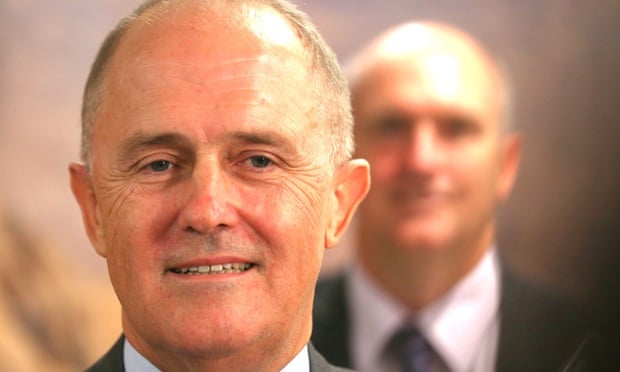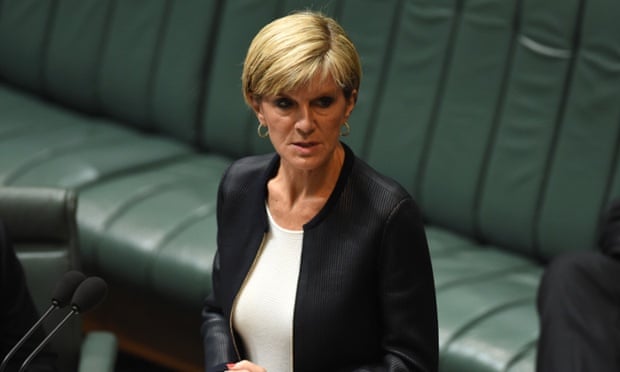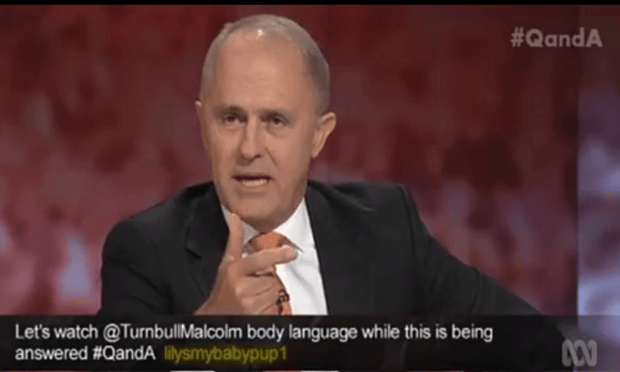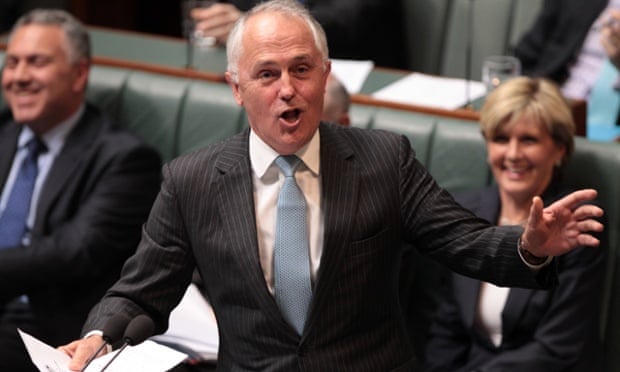
Tony Wright National affairs editor of The Age
March 1, 2015
Bruce Billson, the Small Business Minister in Tony Abbott's government, inadvertently dropped a stink bomb among his tense colleagues during the last day of Parliament last week.
Answering a benign question about petrol prices, he took a swipe at the previous Labor government's attitude to the price watchdog, the ACCC.
"What we've found under the previous Labor Government, while they're changing leaders, changing ministers, five in 15 months, they actually forgot to actually give the resources to the ACCC to do its job properly," he said, though much of the tortured sentence was quite drowned out.
Is a nod as good as a wink? Tony Abbott and Malcolm Turnbull. Photo: Alex Ellinghausen
He had no sooner mentioned the words "changing leaders" than the opposition benches were consumed by an eruption of thigh-slapping, delighted howling and caterwauling.
Advertisement
Billson's colleagues on the government benches stared into space.
There wasn't a person in the chamber - MPs from all sides, spectators in the public galleries and journalists perched like crows waiting for a carcass, as the hapless Kim Beazley once observed of such a moment - who missed the grim irony.
Illustration: Matt Golding. Photo: Matt Golding
The Liberals, loath to breathe it aloud for attributed quotation, are preparing to do what they have not done since 1971 - unload their own prime minister (it was John Gorton back then). Just like Labor.
Tony Abbott's problem, despite his promise to recast his approach, is that a majority of members of his party room appear to have not only decided, but have moved beyond a decision, as if it were inevitable.
"We're trying to get our heads around what Malcolm will be like," said an MP who has never been a supporter of Malcolm Turnbull, but who is preparing to swallow past doubts.
The problem for those hankering for change right now is they don't have the mechanism or the trigger or declared contender in place to do it, even though the frenzied led a couple of news organisations to get ahead of themselves on Thursday, reporting that Turnbull had the numbers and a vote was days away.
Turnbull, a bruised veteran of party room spills over more than seven years - he lost to Brendan Nelson, won against Nelson, then lost to Tony Abbott - is not about to challenge outright, having offered studied loyalty to his leader. He clearly wants events led by others to deliver him the prime ministership, leaving him with clean hands.
Julie Bishop is also thought to be wearied of her long years as Liberal deputy to Nelson, Turnbull and Abbott and is seen as a possible contender for the leadership. She is attractive to those in the party not swept away by the prospect of the moderate Turnbull, who some fear could lose the conservative "base", despite his supporters speaking of him as offering a "sensible centre".
Bishop, however, is keeping her powder and options dry. She has much to consider. The previous assumption of a deal for her to be Turnbull's deputy should he become party leader is no longer obvious, and her continuing role as Foreign Minister could even be clouded as a Turnbull administration looked for a new Attorney-General to replace George Brandis, no favourite of Turnbull.
Even the newly minted Social Services Minister Scott Morrison, keen to show himself much more user-friendly since using his power as a blunt instrument to successfully "stop the boats", is being mentioned in the leadership mix.
However, he is considered more likely to emerge as Treasurer to replace the unfortunate Joe Hockey should Turnbull become prime minister. Morrison laid out his credentials clearly during his recent appearance at the National Press Club, pointedly declaring several times that his position as Social Services Minister made him steward of one-third of the nation's entire budget.
But without Turnbull, Bishop or Morrison prepared to declare and the backbench insisting it is up to ministers to either tap Abbott on the shoulder - a gesture certain to be rebuffed - or a party room spill, the mechanism for leadership change remains beyond immediate reach.
A "trigger" to force the ministers to act would be required.
That often means a particularly disastrous, attention-grabbing public poll.
Close observers have been holding their breath for significant movement in public sentiment in NSW, where the state government is to face electors on March 28. The state Liberals have long been expected to be returned comfortably against a raggedy Labor Party. The Liberals nationwide, thus, would be in flat panic if NSW were to become another Victorian or Queensland catastrophe, and the "Abbott effect" would get much of the blame.
But yesterday's Newspoll showed Baird is still tracking towards a victory, even though Labor's primary vote has struggled back from 33 per cent to a relatively respectable 36 per cent.
Not enough there to engender a trigger-pulling panic.
Nevertheless, the problems swirling around Abbott have become so numerous the arguments for retaining him - principally, that he brought the Coalition back to government after six years, slaying the Labor administration in the doing of it - no longer balance the ledger for most of his colleagues.
South Australian Liberal MPs are appalled at the government's failure to offer a clear future for Adelaide's naval shipyards; moderates are taken aback by the ferocity of the attack on Human Rights Commission president Gillian Triggs; a leaked letter from the party's treasurer, Phil Higginson, accused the party of allowing a conflict of interest because federal director Brian Loughnane was married to Abbott's chief of staff, Peta Credlin. Even more seriously, Higginson caused alarm among big donors to the Liberal Party when he declared he had been unable to get adequate information about the party's funds from Loughnane.
Abbott didn't help himself when, having faced down the party room revolt that threatened to spill the leadership, he promised no retribution - and then sacked his chief whip, party elder Philip Ruddock.
Much of the steam has even gone out of Abbott's best last plea - that the Coalition could not allow itself to replay the fatal leadership chaos of the Rudd-Gillard-Rudd years.
But now, the mere words "changing leaders" cause Labor MPs to fall about laughing, and Abbott's ranks can do nothing but stare into space.
"Tony said the people elected him and it's only the people who should decide whether he stays," a NSW backbencher told Fairfax. "But it was the party room that elected him as leader. It will be the party room that decides."
Only the when and how remain elusive.
Party room appears to have already decided Tony Abbott's fate


 Photo: We should look at the stripping of dual nationality as a military and intelligence targeting issue. (AFP: Ho/ISIS)
Photo: We should look at the stripping of dual nationality as a military and intelligence targeting issue. (AFP: Ho/ISIS) 


 Photo: Turnbull has in recent days pointedly contradicted his leader. (AAP: Lukas Coch)
Photo: Turnbull has in recent days pointedly contradicted his leader. (AAP: Lukas Coch)  Photo: Coalition MPs have told the ABC that Malcolm Turnbull has the numbers to oust Tony Abbott (AAP: Lukas Coch)
Photo: Coalition MPs have told the ABC that Malcolm Turnbull has the numbers to oust Tony Abbott (AAP: Lukas Coch) 
 Photo: Malcolm Turnbull has described HRC president Gillian Triggs as a "distinguished academic", despite the Prime Minister's earlier comments. (AAP: Mick Tsikas)
Photo: Malcolm Turnbull has described HRC president Gillian Triggs as a "distinguished academic", despite the Prime Minister's earlier comments. (AAP: Mick Tsikas) 

 Photo: Power couple ... Peta Credlin and Brian Loughnane. (AAP: Alan Porritt)
Photo: Power couple ... Peta Credlin and Brian Loughnane. (AAP: Alan Porritt) 
 Photo: Tony Abbott's detractors and supporters have taken to the media to fight it out. (AAP: Lukas Coch)
Photo: Tony Abbott's detractors and supporters have taken to the media to fight it out. (AAP: Lukas Coch) 



